Will Wright Speaks Simlish
The Sims celebrates its five-year anniversary this month, but it all started with a toilet. GameSpy.com interviews Will Wright.
Will Wright Speaks Simlish
By Dave 'Fargo' Kosak
The Sims celebrates its five-year anniversary this month, but it all started with a toilet. GameSpy's Fargo sits down for a lengthy chat about the history of the game, open-ended design, and more...
You read that right: it's been five years since The Sims exploded onto the PC gaming scene. A mainstream success almost overnight, The Sims and its subsequent sequel and expansion packs have sold tens of millions of copies worldwide. But the man behind the magic is no stranger to success: game designer Will Wright has been wowing gamers with classics such as SimCity for over 15 years.
But for me, personally, just sitting down to chat with Will is almost as much fun as playing one of his games. Wright's mind is always turning, always looking at possibilities, always examining gameplay from both a scientific and artistic perspective. This recent five-year milestone for The Sims gave me an opportunity to sit down and pick his brain about the history of the franchise, the rocky road leading to the game's development, and his thoughts on why there aren't more open-ended games on the market.
Dave 'Fargo' Kosak: First question for you. Does it really feel like five years? Has time flown?
 Will Wright: Feels like a lot's happened in that time frame. It doesn't feel like five years -- it feels more like three. I guess for me this whole Sims thing was a lot longer cause the very first prototype I built of it was '93 ... so that would be 12 years.
Will Wright: Feels like a lot's happened in that time frame. It doesn't feel like five years -- it feels more like three. I guess for me this whole Sims thing was a lot longer cause the very first prototype I built of it was '93 ... so that would be 12 years.
Fargo: I understand it was kind of a maverick project at first. It was just you and a dream.
Wright: Yeah it was kind of low-level at first. I put it down for a few years while I was doing SimCity 2000 and Sim Copter. I picked it back up and it was still pretty low level, and that's when it was kind of very hard to sell everyone else on the idea.
Fargo: How many people did you have on the team?
Wright: Well initially it was just me. Around '93 I did the initial prototype myself. When we picked it up after that, it was me and one other programmer, Jamie Doornbos, who was basically developing the behavioral engine. We spent around a year and a half, just the two of us developing that. Once we had a sense of what [the behavioral engine] could do, that's the part when the design coalesced in my mind and I said "This is doable." We had to make sure the behavioral simulation was doable.
Fargo: So when did you first get the idea that "I'm gonna make a game about people?"
Wright: I had a rough idea in '93 and I did a prototype of the building game and moving the person around and having them interact with objects back in '93. Then as it became more focused around the people I started thinking about having them talk and interact, to have moods and relationships. It became real clear that we needed a pretty robust behavioral model, especially since the user would be designing the entire environment.
Most games the designer who designs the environment. You know, 'This guy has to hide behind this box and shoot at me when I go in front of him...'
Fargo: It's all scripted.
Wright: Right! But in this environment all of a sudden the user can build anything. He can put the guy in a room with nothing but a chair or he can put him in a mansion or have 10 people come over to party. It has to be plausible across an extreme range of situations. That's an entirely different type of AI. When I came back on the project I understood that was going to be the strength. Could we build a robust AI that could deal with all these situations? I had a clear idea of what the game was going to be, and I just wanted to mitigate the technology risk. To me the one thing keeping me from building my game was the behavioral engine.
Convincing people it was a good idea...
Fargo: So that was the first step. At what point did you know you had that engine in place? When did you feel comfortable going ahead with the rest of it?
Wright: About a year into it. We actually took a very early version of the engine and used it in SimCopter. That was kind of the first test of it. But we knew at that point we could do it, from there it was more a matter of how we represent everything.
Fargo: Now I understand it took you a long time to find a publisher at first? ...no?
Wright: For SimCity it did. For The Sims, I'd started Maxis and I was basically trying to get people inside of Maxis enthused about the idea and that's where the battle was. Those people wanted to keep doing SimCity, and they didn't think The Sims made sense. So I was fighting just the internal structure of Maxis... which is the company I'd started!
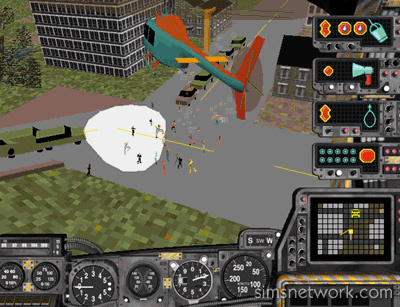
The tiny people in SimCopter moved around using an early version of the Sims behavioral engine.
Fargo: What kind of reactions did people have? How were they looking at the game?
Wright: The game was just so mundane they couldn't imagine -- they could kind of see that you'd want to build this city and have these grandiose towers, but why you'd want to go clean the toilet and answer the front door didn't make sense. To be fair at the time nobody had-- well, in my mind I had a sense of what we could do with the behavioral engine, but up to that point there had been no example in games of anything but scripted simple behavior. So I don't think people understood how robust a range of situations that this game could simulate.
I don't think they had an existing model in their head for what this game could do. Usually people look at games and say "oh yeah really good graphics like Half-life" or "engaging gameplay like Civilization" or they have some model in their head where "its like this." But when you don't have a template to judge it against, its really hard to get somebody to share your vision. When you have all these little moving parts in your head (where 'this is going to do that' and 'this thing's connected to that' and 'it's gonna end up like this thing' and it's really cool), its easy for one person like a designer to build a model in their head, in their imagination. But how these things are all going to come together and create a compelling experience, its very hard to download that imaginary model to somebody else to where they can basically play the game in their head and see the game years down the road.
Fargo: Was there a turning point within Maxis? Can you remember any point where the Maxis team said "Oh we like this idea now"?
Wright: Well what happened is we had an external group, a little office in San Mateo, where we had like four guys working there and it was our core technology group. We had some really smart guys doing tools, some next generation technology R&D for us. That group wasn't getting much traction. They were developing these cool ideas and things but the product teams were too busy in their own worlds to use any of them. So we felt that core tech team wasn't working. We had smart guys doing cool things, but we didn't actually seem to know how to transfer it into any products.
And so at some point I couldn't get enough resources on The Sims and we wanted to staff it as a project and I said 'well just give me the core tech team.' At that point they said 'sure ... we're not using their stuff anyway.' And so I actually moved Jamie [Doornbos] to that new office and turned the core tech team into the core Sims team. That's how I got the team started. They were still working in a separate office and nobody really saw them. I would drive down there and interact with them several times a week. That's kind of the state we were in when Electronic Arts purchased Maxis.
We [Maxis and EA] went over all the projects we were working on, and when they saw The Sims the EA execs were much more enthusiastic about it. After EA bought Maxis all of a sudden I never had to argue again about getting resources on the project, because they were totally behind it.
Fargo: So they were totally sold on it, and saw a mainstream opportunity maybe?
Wright: Yeah. They brought in a couple of high level execs who actually came in and looked at it, like Luc Barthelet who became our General Manager, and they all kind of 'got' it. After EA bought Maxis they were saying 'this is one of the reasons we bought Maxis.'
It started with a toilet...
Fargo: I understand at one point people called it "The Toilet Game?"
Wright: [Laughs] Actually in the very first prototype I made in '93, that was the one object I had in the game. You could build walls, you could move little guys around, you had terrain, and there was a toilet. That was the only object interaction.
Fargo: Why a toilet?
Wright: Well it was actually an interesting object to me because it had so many different interactions with it. You know, you could clean the toilet, you could use the toilet...
Fargo: You could leave the seat up...
Wright: Yes! That was the big difference. The toilet is, I think -- at least in the first Sims -- the only object that the different genders used differently. The men left the seat up.
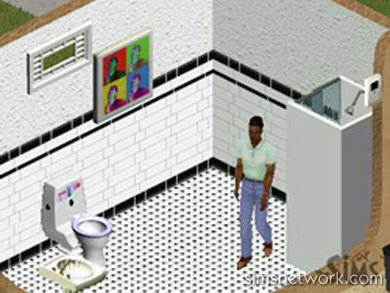
A man, a dream... and a toilet.
Fargo: So it began with the toilet?
Wright: Yeah.
Fargo: Excellent! Was there a moment where you were playing the game where you said "Its definitely gonna work for me. Its definitely coming together like I saw in my head?"
Wright: Well the original prototype I did in '93 was really focused on the build mode. The first thing I wanted was basically "Sim Architect" and I really enjoyed that. Even with the prototype I really enjoyed just building the different houses. That part I knew, very early on, worked for me. The home design part of the game I thought: 'I could spend hours on this.'
Then once we got to the behavioral part and we started doing the simulation there was some point in there which we went through a couple major rethinkings of how the whole thing would work. We ended up with a pretty elegant structure fairly early on, about a year into it. When I could step back and I could imagine "oh yeah this is a simple structure that we can simulate almost any object we can encounter and the Sims would use it in an appropriate manner." It wasn't on screen at that point -- it was just in my head -- but I understood we had the right approach for pushing the AI.
Fargo: Now, on the flip side: did you ever have any doubts? Did you ever go home and say "Wow, I'm making a game about washing dishes it's gonna go terribly wrong."
Wright: Well, I thought that marketing might drop the ball. I thought that this was a game that I would enjoy playing from square one, otherwise I wouldn't have spent so much time and effort on it. As we got closer to release I had much higher confidence levels, but even then I thought that either marketing would kind of screw it up and the game would be a flop or it would be a pretty big success. But I didn't anywhere near foresee the success it became. At the time I thought 'maybe it might be as big as SimCity.'
Fargo: So were you happy with the marketing?
Wright: Oh no the marketing was brilliant! And it wasn't just the marketing. The General Manager of our studio, Luc Barthelet, took a very strong interest in building a community around the game cause we'd put this heavy emphasis on customization. We probably spent an extra year in development making so many parts of the game customizable. Had the game been a flop that would have been a wasted year. But if the game was a success then that year would be well worth it because of the community we could build around the game. Quake 2 was like my model. I was looking at the Quake community and studying it and trying to figure out why it became large. I was hoping to get a community as strong as the Quake community... We did some very innovative [community] events leading up to the launch. So a lot of it was the marketing, but it was also the internal community building that we did.
Creating a community...
Fargo: What kind of events leading up to the launch did you do?
Wright: Well one thing we did, we had a lot of fan sites that people started putting up. We started releasing tools early for customizing characters. One thing we did for the three months up to launch is every Thursday we would have a chat event on the web. In our chatroom there was a live webcam on the top of the page of us playing the game, straight from the game. So while we were running the chat we were actually running the game and twice a second we were spitting out an image. Then people in the chatroom were asking us "Can you make him do this?" or "What if he kisses this girl?" or "What if he goes and does that?" and they were basically backseat drivers. And then we'd say "Oh yeah we can do this" and we'd have them walk around and do stuff, and we were actually playing the game with them in chatroom.
Now this did two things. First of all it gave them a really good sense for how open ended the game was. Because no matter how much we said the game's open ended, you have to see it to believe it. And they'd come up with these weird situations and then we'd actually do it. We would prove that just about anything you can imagine you can do in this game. But the second and probably more important thing is that we had all these websites and what they all liked to do is have interesting and unique content that's different from the other websites. So these people in the chatroom could capture every image we were sending them, which they could later go pick through and use on their website. So we were actually streaming out huge amounts of content that they could then use on their website.
Fargo: I imagine it was a great focus group, too, because the stuff they were shouting out was probably exactly what gamers would do when they got the game...
Wright: Oh yeah. It was useful. We got a sense of what to expect from the average user and so we were able to actually pollinate [these websites] with huge amounts of content.
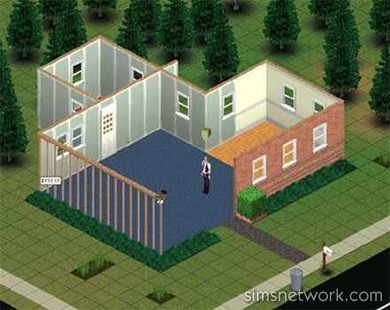
The Sims remained completely open-ended:
It was what you made of it!
Fargo: Did you ever have any pressure from anybody to set win conditions in the game?
Wright: Not really. We had a lot of discussions about how "story based" the game should be but it was pretty clear when you sat and played the game that the player was telling the story. This is something we decided early on. We'd kinda been down a couple paths: "Oh we should have tightly knit scenarios" and "You have to do this to win." That's closer to the path the console version went right now. But with the PC version we kind of toyed with the idea but decided the customization and the user brought-in experience was far more compelling.
Critical reactions to The Sims when it finally came out...
Fargo: Okay, so The Sims has gone gold. It's shipping and it's gonna be out in stores! What were you thinking? What did you think the reaction would be from the press, from the public? What was going through your head?
Wright: I remember the very first review we got was actually quite negative. It was some little website and somebody just wrote a pretty scathing review of the game. It was pretty depressing reading that first review, but it was like two days later before every other review came out that was raving about the game. So that first review kind of rattled me, like "Oh my God they didn't get it. I hope somebody else gets it!" But it was pretty temporary.
Fargo: Let's move on and talk about the user community. So it sounds like it was always the plan to have the community involved?
Wright: Oh yeah. We could have probably have shipped the game a year early, but a lot of it was making the objects expandable so you could drop new objects in the game the Sims would automatically know how to use them. And the objects wouldn't need to know about pre-existing objects. There was a lot of insulation we had to do -- it has a lot to do with data dependency and object-oriented programming, lots of technical issues. But then all the other parts of the game, like the custom character skins, the custom build mod -- any part of the game that we thought the users would want to expand -- we tried to figure out a plan for doing that. And then helping the users share the stuff, pollinate it around. A lot of the stuff the fans figured out. When they have 10 skins on their site it's no big deal, but when all of a sudden they have 10,000...
Fargo: Suddenly they've got to build a database.
Wright: And for them it's a pretty big load. But they figured it out pretty quickly. And they figured out how to do custom meshes! We never gave them the tool for doing custom meshes on characters, but they built their own tools. Within two years the fans had created their own tools, like 30 or 40 different tools the fans had created for customizing the interface, customizing the meshes...
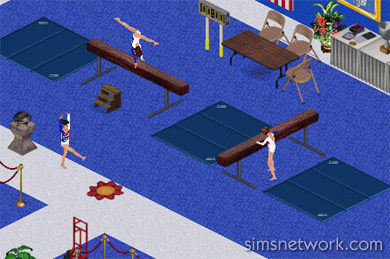
The community has generated some incredible content, such as these working balance beams.
Fargo: Did you find that any of them that were better than the tools your development team was using?
Wright: Well a lot of them were tools that we didn't have-- Well the tools we were using-- that's a good question. In a couple cases maybe, but for the most part we were using Maya or 3D Studio Max, so they [the community tools] were easier to use then our tools.
Fargo: Did you ever have to fight a battle to keep the game so open to the community? Especially if you were going to take an extra year of development. Did you ever have to really convince people that it was going to be worth it?
Wright: The battle really had more to do with opening the file formats. This goes back to weird legal battles that have been fought in the game industry over the years. I don't know if you remember, I guess it was Activision -- who published Links, the golf game? Before Microsoft was it Activision? Or Accolade? [Editor's note: It was actually Access Software, though neither of us could recall at the time.] They had this golf game and they sold course discs and at some point somebody reverse engineered their course format and started selling course discs for their golf game. They sued them for actually using their file format and there was this long legal battle. It's a very grey area, legally, about whether if you publish your file format if you loose control of it or if you retain it -- I won't go into details. But a lot of the issues we were dealing with weren't technical, but we were setting precedents. For instance when a person takes one of our objects and mods it, changes the looks of it, objects contain all of the code for the behavior. So even though they just changed the bitmap of an object, if they're giving it to somebody else they're actually giving somebody our code that we wrote. And there're certain things that you have to do to protect your legal right.
Fargo: Did you run into any issues since the release then?
Wright: None of them really panned out to be big issues, but at the time we didn't know what was an issue and what wasn't. In fact the legal people at EA were very accommodating. I was used to working with very uptight lawyers but the EA people are very committed to us exploring [community content] as much as possible without putting them, you know, in an uncomfortable legal position. But most of that stuff didn't end up really being an issue at all.
Expansions pave the way for Sims 2, while the community continues to surprise...
Fargo: Give me an example of something that came out of the community that blew you away when you saw it.
Wright: Well a lot of the stories that they were telling using the story-telling tool blew me away right off the bat. A lot of the weird, interesting content that we first started seeing was in the stories, and these were things where they were finding ways to manipulate the mesh. We didn't even know what tool they were using to do that! There was one story where it was at a ski resort, and they had the Sims all skiing down a hill with skis on and stuff, and it was like "How'd you do that?" Or a ski lift! They found ways to do weird things like that. I've had tremendous entertainment looking at how far the community has carried it even far beyond what we thought they could do. It's continually surprised us.
Fargo: Expansion packs! What made you decide to do the first expansion pack?
Wright: I have to admit that, when we did the first expansion pack, I was probably the one person in the entire company arguing against it. Saying, "Why are we wasting time doing expansion packs!?" But in fact it turned out to be a great model for us. It kept interest in the game because a lot of people who would buy The Sims were very casual gamers, unlike a hardcore gamer who buys Halo or whatever and they get home and play intensely for a few weeks and then they go away and buy the next cool game. Our fans would play The Sims kind of on and off a few times a night for months -- years -- and collect a lot of content. To them it was a hobby, an ongoing hobby. They didn't really play any other game. So the expansion packs kind of give them something periodic to look forward to where we can actually change the rules of the game. We can add micro-games or meta-games within the engine giving them brand new activities that they couldn't do before. And also you give them template objects that they could customize.
But also we were able to learn a lot in the expansions. We were able to experiment with a lot of game concepts at fairly low cost and get a sense of which ones the fans liked, which ones they didn't like, which ones were big hits. Like pets -- pets turned out to be a big hit. Being able to leave the house and go downtown was a big hit. We learned a lot from the expansion packs that we were then able to fold into The Sims 2.
Fargo: You could use them as test cases.
Wright: Had we just released The Sims one and tried to guess what to put in The Sims 2, we would have guessed wrong. After having seven expansion packs we had a really good calibration on what things the fans liked and didn't like and it really helped The Sims 2 nail that market. So we think of the expansion packs more now as a mechanism through which the fans can teach us more about the game.
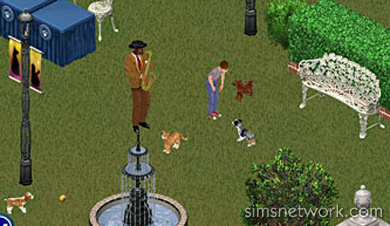
Community lots turned out to be extremely popular, and found their way into the core product of Sims 2.
Fargo: There's an interesting question there then: How would you have done The Sims 2 if you had started working on it right away?
Wright: Well it would have been a mistake working on it right away because so much of The Sims success was based upon the fan community, and the way the community built upon the game and the 'meta-games' that they were playing above the game. If we'd not had visibility into that, and we just started right away on The Sims 2, no telling what type of train wreck it would have been. It would have been the wrong thing.
Fargo: I take it you're very pleased with The Sims 2? It seems to have hit the mark.
Wright: Oh yeah. Yeah I think The Sims 2 nailed it as tight as we could have nailed it. There were a lot of difficult balances to be struck in The Sims 2 between updating the technology that's now five years advanced while retaining some ease-of-use for casual players. The hard time with The Sims 2 was, how do we make this feel like state of the art technology but not all of a sudden close the door to all the first time game players that made The Sims one a success? The content, of course, is much higher quality, which means customizing the content is harder to do. So there were a lot of tricky balance issues there.
Wright's thoughts on Sims Online and a look at why more "sandbox games" aren't in development.
Fargo: The Sims Online. Do you ever think you'll revisit The Sims Online?
Wright: I suspect we will. We learned a lot from it. And I think we're still learning from it. I still go on there once a week and kind of see what all the players have done. There are a couple things, aspirations we had for it, that just didn't turn out to be cost effective. We really wanted to have the customized content that would have totally changed the world, but for technical reasons it ended up being hugely difficult and a lot of other things like that. But I think it's clear that in the future its more and more important that games have an online component, and almost like the expansion packs, we can look at [Sims Online] and learn about what works and what didn't work and figure out how to do it right next time.
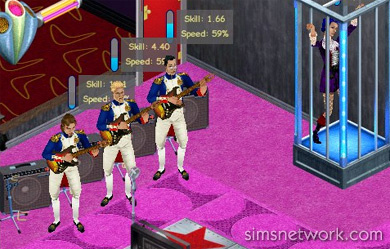
Sims Online was a learning experience. Seen here: My own Napoleonic Death Metal Band.
Fargo: Okay, let's open it up a little and talk about big-picture things. There don't seem to be a lot of "sandbox" games out there, where there's no set goal except for 'build whatever city you feel like building' or 'build whatever family you feel like building.' Why do you think there aren't more games like that?
Wright: It kind of surprises me because I think those games are the way to appeal to the mass market and a more gender-balanced audience. I kind of think the real problem is that most games are made by gamers, and they generally make them for themselves.
Also, just because its a "sandbox" game doesn't mean it doesn't have goal structures. I think of a "sandbox" game as one where it's more the player imposing the goal structures on the experience than the game is imposing the goal structures. But still the game designer has to give them plenty of reward feedback and failure feedback around a larger landscape, a 'goal space.' So rather than having 'Here's the goal of the game,' you now have a space of possible goals that the player can choose and pick from.
Fargo: But no matter what goal they choose, you have to make sure it's still a game.
Wright: So in The Sims I can decide I want to make my Sim really rich, or I want to make him fall in love, or I want him to build a mansion on the hill or whatever it is. Each one of those goal spaces has a pretty obvious failure, and you can track the progress, and it feels like a reward when you get there. It's a little bit more distributed of a model. At the same time, how do you balance all these goal states so that no one of them is stepping on the others? And players can try all three simultaneously? I can be rich, have a big house and fall in love. Or maybe I just care about this one, and that one has to be compelling enough and challenging enough just to climb that one hill.
So I think that "sandbox" game are trickier than "goal-based" games in that sense. They also imply a much larger possibility space that you have to engineer, so you pretty much need a more emergent design to do that. Really I think the more fundamental question is, why aren't we seeing more emergent designs and less of what I call linear scripted designs? And that's because emergence is extraordinarily difficult to engineer. In fact the only way we found to approach it is really through mapping all of the constants, and then through deterministic engineering. So what we do when we have a new project is we do a large amount, and I mean a huge amount, of very simple prototypes of all aspects of the game. Some of them are kinesthetic prototypes: "what does it feel like to move this character around?" Other ones are gameplay prototypes: "what happens if I move these boxes?" And goal structures, and pacing. Some of them are aesthetic prototypes: "How would this look on the screen when animated?"
So basically it's like we're dropping these little paratroopers onto this unknown landscape and each paratrooper is reporting back "Oh this is cool," "That's not," "This is kind of neat," "This is alright." and we start building a map of that space.
More insights into open-ended game design, and rumblings about Wright's next project.
Fargo: So you sorta feel out the landscape of a possible game one piece at a time. Seeing what would be the fun part of this design.
Wright: Right. Rather than saying "Ok we want a game that feels like this, that, and the other thing when we play it. How do we build it emergently?" and that's almost impossible. It's very easy to say "I want an efficient to use word processor" and to go back and write a design spec for that, and its pretty straightforward how these engineering features will add up to this word processing experience. With an emergent game like The Sims or Grand Theft Auto or something like that, it's extraordinarily difficult. And so the only way you can really approach it is empirically. By basically mapping the space and then iteratively redesigning based upon your results, and then building more focused prototypes in a certain area to give you a sense of where the peaks are in this landscape.
Fargo: So you let the game evolve.
Wright: You really map all those peaks to higher and higher resolutions. That's the point at which you can step back and say, "Oh ok, it turns out these five simple rules together add up to really cool interesting behavior. We never would have guessed, we just kind of tripped over it." So I think that that's the real challenge.
Fargo: Kind of a "bottom-up" game design, where you put together real simple elements that help you figure out ultimately what the top looks like.
Wright: Right, right. Yeah, it's basically "what are the five or six simple dynamics that we can put together that additively feel like this very complex, rich world."
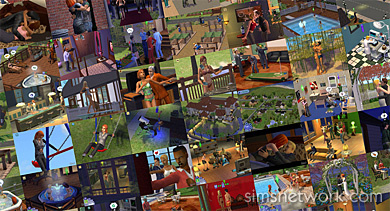
The infinite variety of Sims 2 requires some serious trial-and-error to discover what works. Lessons learned are already being applied to Wright's next project!
Fargo: I heard through the grapevine that you're working on a new franchise, a totally new project.
Wright: It's kind of important. You know, EA especially is very good at taking franchises like The Sims or Madden or whatever it is and doing them year after year and building a very predictable income stream. And what's really important is, that's part of the business, and the other part of the business is how do you take the money you're making from that, and reinvest it into new, creative cool things? You know: How do you build the next franchise? So yeah I think Maxis is actually one of the groups within EA that I think that they're expecting more in that direction than some of the other groups. Because its not, say, sports: It's out-of-the-box thinking.
Fargo: So you've got something cooking there. Another "sandbox," emergent game?
Wright: Yeah, just about any game I would do would do that. Basically, trying to take what I've learned from The Sims, and how to take that to the next level.
Fargo: One final question then: I know you've always got your eyes open for games that have cool emergent elements. What kind of games are you playing right now? What's got your interest?
Wright: I haven't had time in the last month to really play much. I've played the new Grand Theft Auto [San Andreas] which I liked. And Katamari Damacy, which is way cool. Loved the music. I've been waiting actually for Battlefield 2! I'm trying to get a beta copy. That's the one I'm really looking forward to. I'm a total Battlefield 1942 addict.
Fargo: It was awesome talking to you again -- thank you very much!
Wright: Oh no, my pleasure.
From here, the interview dissolved as Wright tried to talk the nearest PR person into landing him a spot in EA's daily Battlefield 2 beta tests. Although he was tight-lipped about his latest project, it's clear that he's constantly experimenting with and refining the process that brings an emergent game like The Sims into fruition. Stick around GameSpy for news of his next project as soon as we hear more!


